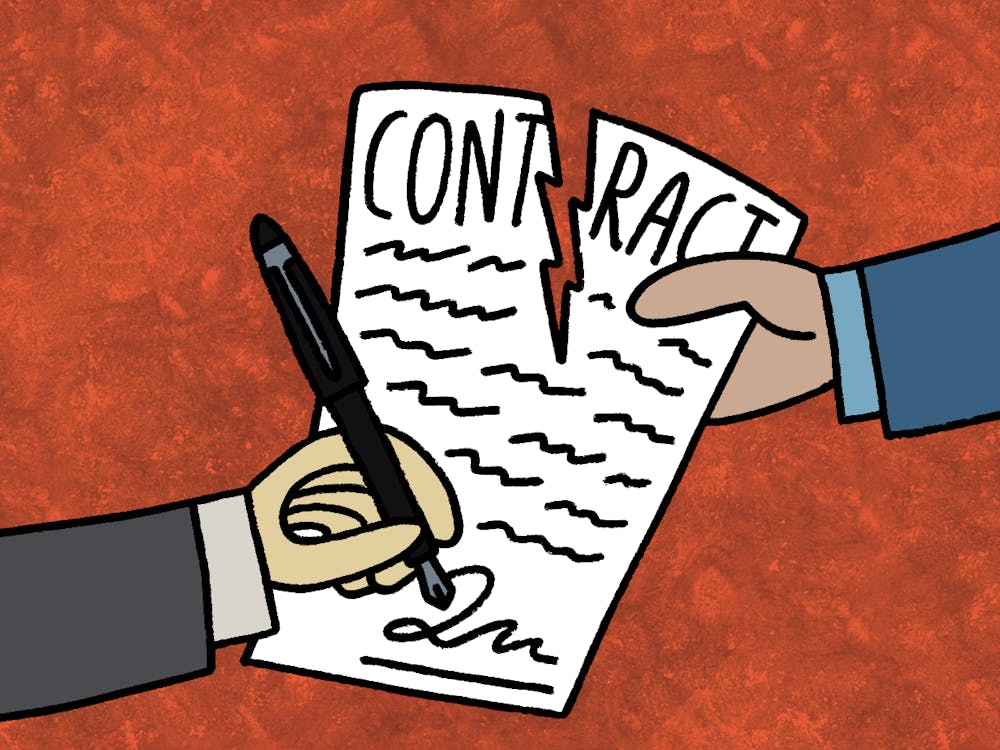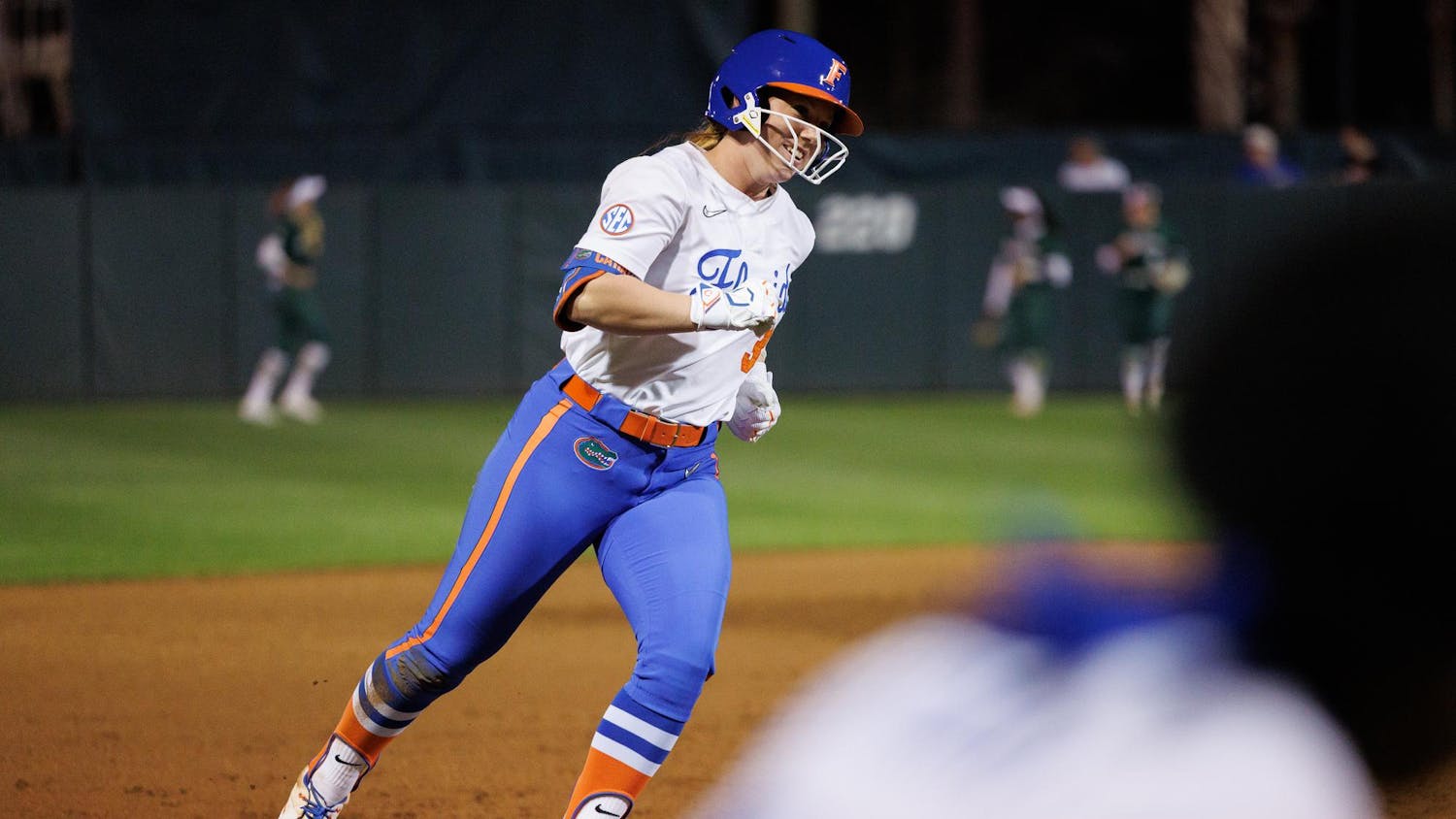Stuck at a standstill, negotiations for higher graduate assistant wages are left temporarily frozen.
After months of back-and-forth with UF’s bargaining team without a counter-proposal, both parties declared an impasse in a July 31 bargaining session.
Patrick Keegan, UF’s chief negotiator, proposed the impasse. Austin Britton, the 27-year-old Graduate Assistants United co-president and geography doctoral student, agreed.
“At this point, the university is prepared to declare impasse,” Keegan said. “I’m not so sure it’s going to be terribly productive for us to continue to meet about [Articles] 10 and 16.”
Graduate Assistants United, which represents more than 4,400 graduate employees, negotiates stipend increases each year. Stipends, which act as fixed salaries for graduate assistants, are granted under Article 10 of the union’s collective bargaining agreement.
Another point of contention was Article 16, which defines the union’s released time program. The program allows graduate assistants to be temporarily released from academic work to contribute to union administrative tasks. Graduate assistants on released time are paid to file paperwork, connect with departments and handle grievances during the union’s office hours.
GAU received a historic raise in 2023, when stipends increased to $19,200 for nine-month appointments and $25,600 for 12-month appointments. Despite the victory, the union hasn’t moved forward with negotiating a livable wage.
“We’ve waited for several months for UF to come back to the table, and it was met with another brick wall,” Britton said at the bargaining session.
He said GAU made “zero progress” over the last several months because the university hasn’t changed its proposal on stipend increases in almost a year. UF wanted to raise the stipend by just $1,000 for graduate assistants on nine-month appointments.
GAU’s goal is to have stipends act as a wage that accounts for rent, inflation, gas prices and healthcare. They aim to increase salaries to around $40,000 a year.
“GAs need to be able to pay rent, they need to be able to eat, they need to be able to live their lives,” Britton said. “For many GAs, the minimum stipend is simply not enough.”
The union interviewed graduate assistants and found 30% of salaries go toward rent alone, he said. While he understands higher wages are a permanent cost increase for the university, the current stipend is not enough for graduate employees to rely on.
Stipends aren’t Britton’s only concern. UF’s desire to eliminate the released time program can leave the union without the administrative work that keeps it alive. The UF bargaining team hasn’t changed its proposal in 16 months, Britton said.
“It's extremely vital to run GAU, especially with the increase in paperwork from laws like SB 256,” Britton said.
Senate Bill 256, which went into effect in July 2023, requires public sector unions to increase the rate of members paying union dues to 60%, or they risk decertification.
GAU began a card-collecting campaign as a result. If 30% of the employees a union speaks for agree to be represented, then the union could stay alive. That’s exactly what GAU did.
Without released-time employees, maintaining the union becomes significantly more challenging, Britton said. With SB 256, the union has extra paperwork, must maintain 60% membership and bridge connections between GAU and graduate assistants across university departments.
“If we're spending all of our time worrying about collecting cards and staying alive, we get to spend that much less time on resolving grievances and making sure GAs know their rights,” Britton said.
Because of the impasse, all other articles agreed upon, such as extending paid leave to 12 weeks, can’t go into effect until the impasse ends and the full contract is ratified. It can take up to a year, he said.
Both bargaining teams are allowed to continue negotiations, but both seem uninterested.
“At this point, we're wasting months, and we're getting no closer to a contract,” Britton said. “We've been negotiating for two years.”
Cassie Urbenz, the 24-year-old GAU co-president and graphic design graduate student, was disappointed having to settle for an impasse. The union received a series of emails about what will happen to the paid leave both teams agreed on.
The story of a couple about to have a child stood out to her, she said. They now won’t get extended paternity leave due to the impasse.
“It’s a bit disappointing that we're going to have to do this, especially because we put in so much effort over the course of the past two years, particularly the past six to nine months,” Urbenz said.
While the full contract can’t be signed until the impasse concludes, previous benefits will still be implemented, she said; it’ll just take longer for them to be implemented.
“It does not mean we’ve lost anything we’ve won,” she said.
The union’s goal is now to ensure people stay informed about the union and the impact of the impasse in the coming months, Urbenz said.
Sorin Jacobs, a 27-year-old UF biomedical sciences doctoral student, was a GAU member for four years before becoming a fellow. Despite no longer qualifying as a graduate assistant, she was devastated to hear UF wasn’t seeing eye to eye with the union.
Jacobs considers herself lucky. As an employee of the College of Medicine, she gets paid slightly more than the minimum stipend for a graduate assistant on a 12-month appointment. The college believes it’s a way to keep good graduate students employed, she said.
“The stipends, as they stand, are just not a living wage at all,” Jacobs said. “I think everyone knows this, but it's not even keeping up with the amount of inflation we've seen in Gainesville.”
Jacobs’ rent has gone up $300 a month since moving to Gainesville four years ago, she said. Her wife, who’s on a nine-month appointment, wouldn’t be able to afford rent if she lived alone.
“There's an idea that Gainesville is an affordable city, and so it's fine that our stipends are low,” she said. “It's just as expensive to live here as it is in a lot of cities that are paying much more to their graduate students.”
It can discourage UF graduate student enrollment, she added. Jacobs often helps with recruitment for her program and has seen candidates reject UF because they won’t get paid enough, she said.
“The university, as a whole, is benefiting so much from grad students,” she said. “Grad students make the university run. I think it would just be appropriate if the university actually respected that and paid grad students what they were worth.”
Contact Delia Rose Sauer at drosesauer@alligator.org. Follow her on X @_delia_rose_.
Delia Rose Sauer is a journalism senior and the Summer 2025 Editor-in-Chief. She reported on the university desk for two semesters. When she's not glued to her laptop, she's drawing on Procreate, crocheting or creating a new Spotify playlist.






